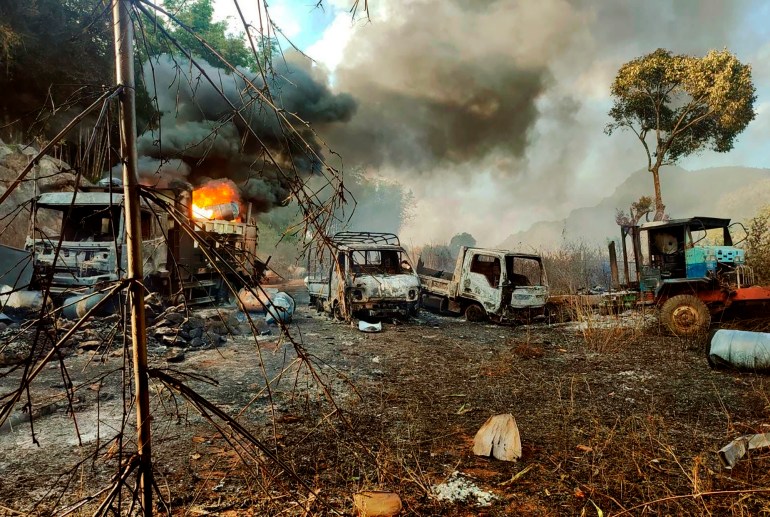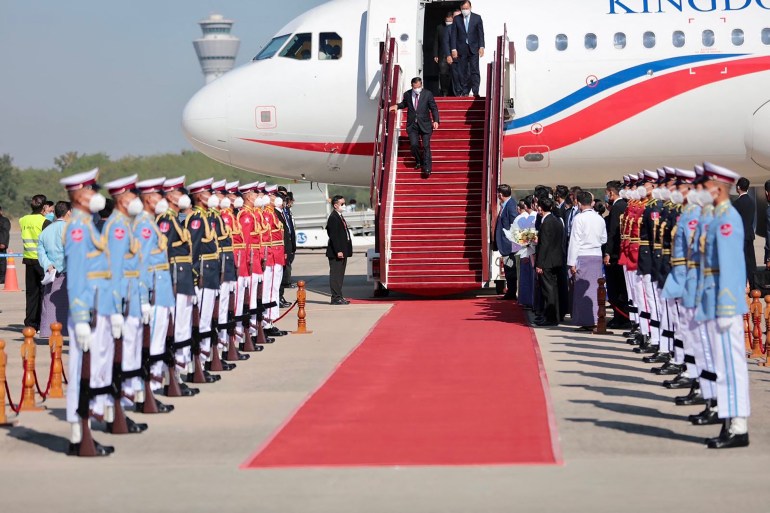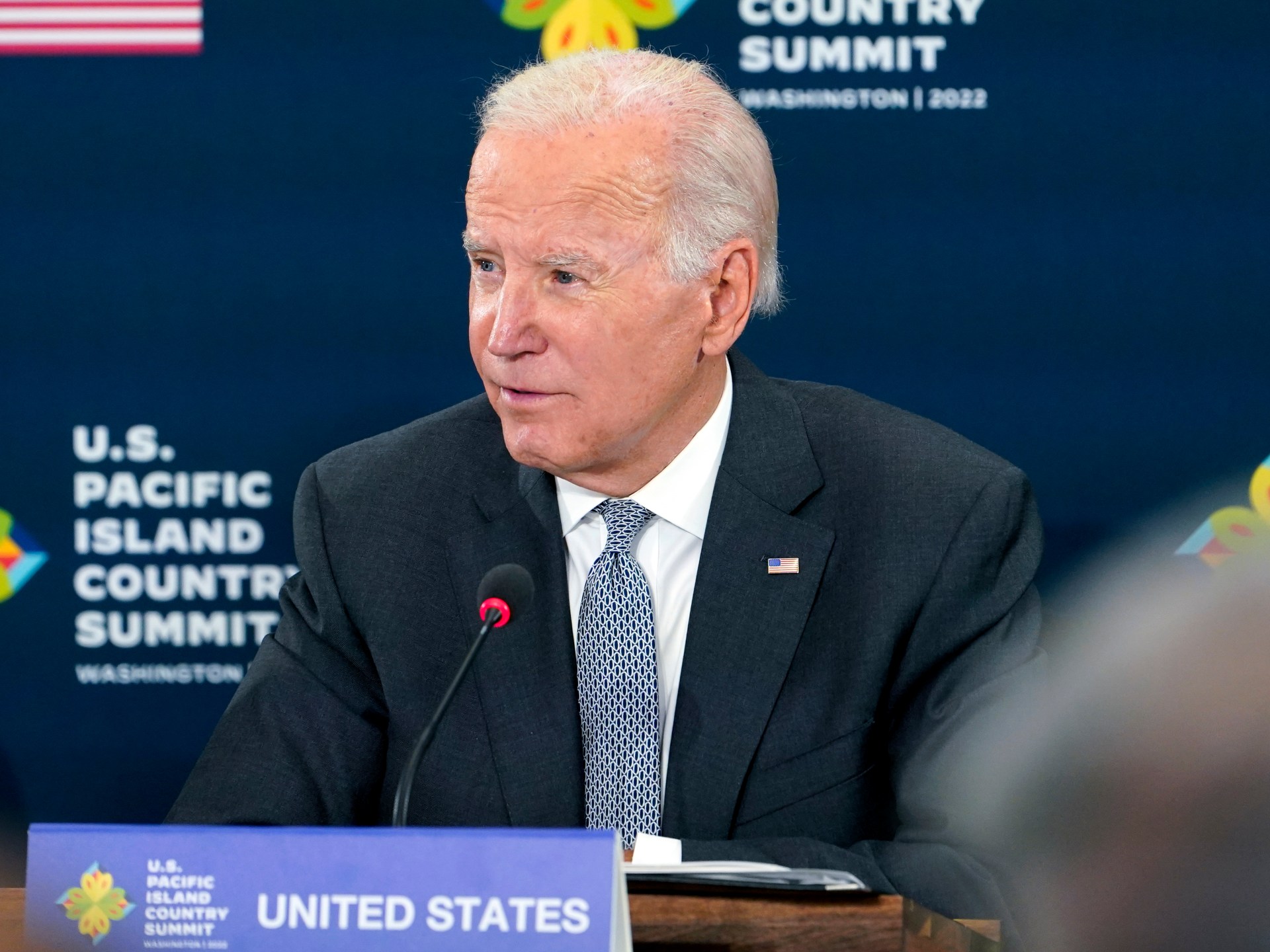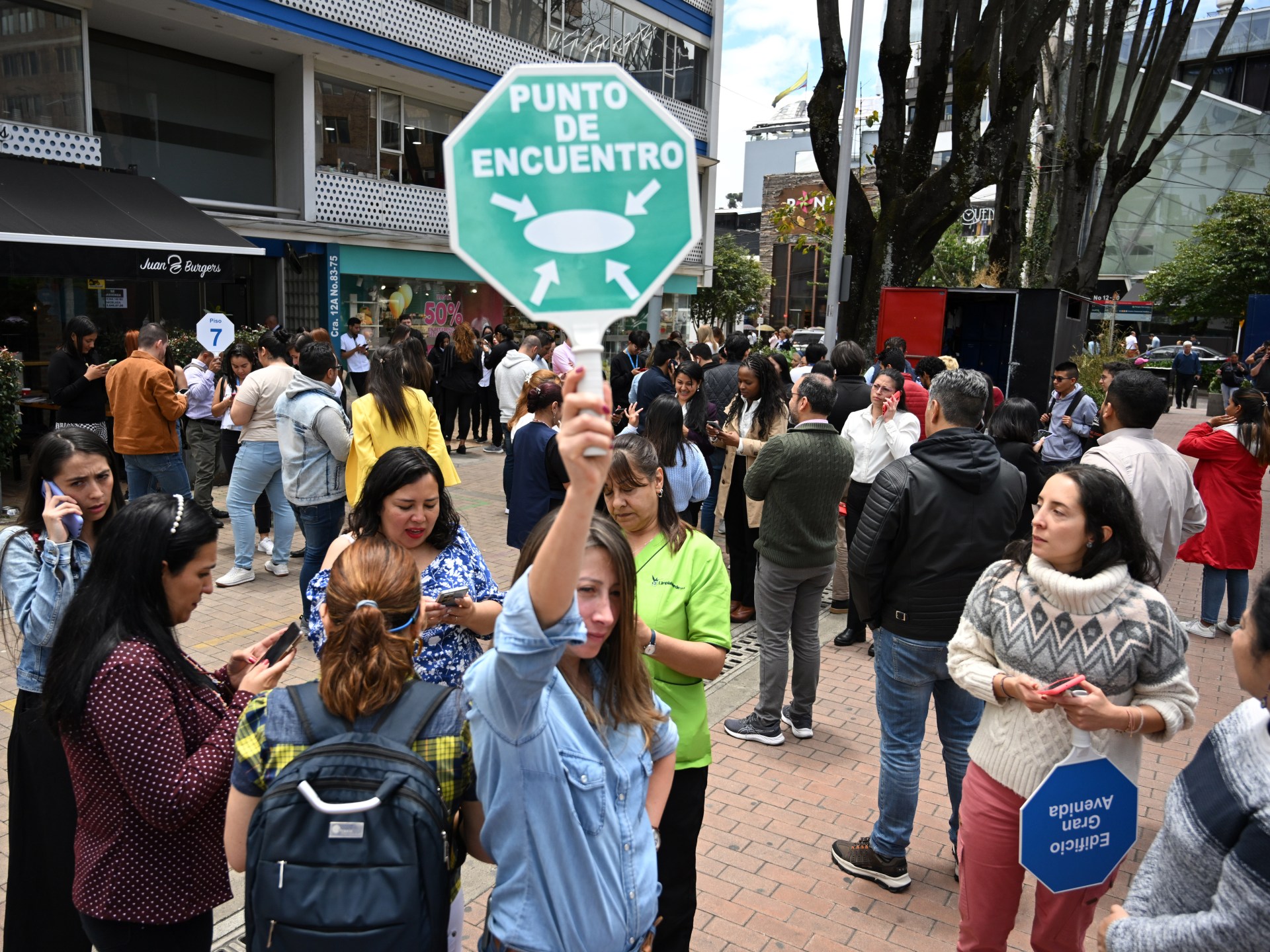World accused of ‘sitting and watching’ as Myanmar slides to war | Military News
One year since the military coup in Myanmar, calls for international action are growing louder, notably from the National Unity Government (NUG), made up of elected politicians who were thrown out of office by the generals.
“The world is doing nothing but just sitting and watching,” NUG Foreign Minister Zin Mar Aung told Al Jazeera.
“In the past year, we have seen extreme brutality and atrocity against the population. We have also seen clear determination from the younger generation, a new generation who are saying they will not accept the regime.”
Attacks against civilians, protesters and political activists have escalated in recent months.
What began as tear gassing and beatings have now turned into air assaults, the burning of villages, and targeted shootings across the country.
Herself a victim of the military’s political repression, Zin Mar Aung in 1998 was sentenced to 28 years in prison for political activism. She spent nine of those years in solitary confinement and was released after 11 years.
But Zin Mar Aung says the violence today is worse than the dark decades of previous military regimes of the 1980s and 1990s.
“It’s much worse than what we have seen before. A lot of people used to die in prison and be tortured,” she said. “The atrocity has not lessened. Now they have escalated – they used to do it behind closed doors, but now they do it publicly. Without pragmatic and effective intervention from the international community, this will continue.”
More than 1,500 people have been killed since the coup, according to the Assistance Association for Political Prisoners, which has been monitoring the violence since the start.
Rights group Human Rights Watch says the military’s actions amount to crimes against humanity and include openly shooting 65 protesters and bystanders in Yangon’s Hlaing Tharyar township, the deliberate ramming of protesters in a car in Yangon, and a Christmas Eve attack on civilians in eastern Myanmar that left dozens dead, including women and children and two staff from the non-profit, Save the Children.
 On Christmas Eve, the Myanmar military was accused of rounding up villagers, shooting dead more than 30 people and burning their bodies in an attack in the east of the country [Karenni Nationalities Defence Force via AP Photo]
On Christmas Eve, the Myanmar military was accused of rounding up villagers, shooting dead more than 30 people and burning their bodies in an attack in the east of the country [Karenni Nationalities Defence Force via AP Photo]Attacks on villagers are also continuing in the ethnic border regions, in an escalation of fighting that has been taking place for decades and culminated in the brutal crackdown on the Rohingya in 2017 that is now the subject of an international genocide investigation.
Having avoided censure for so long, observers say the military is confident it will continue to do so.
“Decades of impunity for the worst crimes have created a mindset that soldiers can brazenly commit such atrocities without fear of being held accountable,” Human Rights Watch researcher Manny Maung wrote recently.
Witnesses to atrocity
But the brutality is increasingly being documented – thanks to the preponderance of mobile phones.
Myanmar Witness is a not-for-profit organisation that aims to collate such evidence in an anonymous and safe open source database.
The team uses a variety of verification techniques – such as using Google Earth satellite imagery, weather reports and online image reverse searching – to verify the accuracy of the footage they receive from witnesses and activists.
Having previously used digital technologies to document abuses in Syria and elsewhere, Investigations Director Ben Strick says that safe and anonymous reporting platforms such as Myanmar Witness are vital to archive human rights abuses.
“It’s a bit scary at the moment because people are not reporting out of fear,” he told Al Jazeera.
“So, we are able to really use a lot of these digital techniques to pick out a lot more stories than what is actually being heard out of Myanmar.”
Despite the efforts to ensure digital safety for those submitting evidence, Strick worries about the risks involved for those on the ground.
“We are able to take a photo and find out exactly where it was taken from. But other people can do that as well,” Strick told Al Jazeera. “If someone is filming from their apartment and they are filming the military in the street, that can be found both by civilians who support the government but also the government themselves.”
Since the February 1 coup, Myanmar Witness has collated more than 4,000 entries, of which 740 have been accurately verified.
The group hopes that the collated evidence will be used by the international community to eventually bring the perpetrators to justice.
“I think there is a huge amount digitally that the international community can do and is doing, but there is still a lot more that can be done to chip away at the marble stone that is human rights issues in Myanmar,” said Strick.
Despite the growing database of evidence, it remains unclear whether the international community has the political will, or the means, to intervene in Myanmar.
On the eve of the one-year anniversary of the coup, United Nations’ human rights chief Michelle Bachelet condemned the international response as “ineffectual” saying it lacked “a sense of urgency commensurate to the magnitude of the crisis”.
Bachelet said it was time for a more robust response.
“It is time for an urgent, renewed effort to restore human rights and democracy in Myanmar and ensure that perpetrators of systemic human rights violations and abuses are held to account,” she said.
UNICEF Regional Director, Debora Comini, meanwhile, said the agency was “gravely concerned” by the escalating conflict and condemned the reported use of air attacks and heavy weaponry in civilian areas, in particular, attacks on children and NGOs such as Save the Children.
“We are particularly outraged about the attacks on children that have occurred during this escalation in fighting across the country.”
Concerted action needed
Fortify Rights, which has been working in Myanmar since 2013, has been calling on the UN Security Council to impose an arms embargo.
But Ismail Wolff, the group’s regional director, says there is no sign of the unified action necessary for such a move with veto-wielding members China and Russia showing a reluctance to act.
Wolff told Al Jazeera that while there have been individual responses from UN member states such as the US, UK, European Union, and Australia, “they haven’t been sufficient to cause enough of an impact on the Myanmar military for them to change their thinking or to try and pressure them into rethinking this coup and whether it is in their interests or not.
“The UK could put forward a resolution, but so far we’ve seen China and Russia specifically – the other permanent members of the security council – they would veto any resolution calling for a global arms embargo, which is essential to end the oppression of the Myanmar people by this quite heinous regime.”
 Cambodia’s Hun Sen got the red carpet treatment in January when he became the first foreign leader to visit Myanmar since the coup [Myanmar Military Information Team via AFP]
Cambodia’s Hun Sen got the red carpet treatment in January when he became the first foreign leader to visit Myanmar since the coup [Myanmar Military Information Team via AFP]In the absence of concerted UN action, the diplomatic initiative has fallen to the Association of Southeast Asian Nations (ASEAN), which Myanmar joined in 1997 under a previous military regime.
Coup leader Min Aung Hlaing has so far shown no commitment to implementing a plan to end the violence that he agreed with ASEAN in April last year.
“Everyone has to be clear on the limitations of ASEAN,” Wolff said. “It operates on consensus [and as such] you are not going to see any strong, principled decisions being made on the Myanmar situation that would have enough of an impact for the Tatmadaw – the Myanmar dictatorship – to reverse course.”
In the absence of UN action, some foreign investors, including oil companies Total, Chevron and Woodside Petroleum have suspended business in Myanmar, cutting a major source of revenue for the military which has long operated a sprawling network of businesses.
At Myanmar Witness, Ben Strick says moves such as these can have an immediate effect. His organisation recently documented an arms shipment from Russia.
Fortify Rights’ Wolff agrees that documenting the evidence is vital and adds that the NUG is currently submitting an application to the UN Security Council to accede to the Rome Statute that would give the International Criminal Court jurisdiction in Myanmar. The UN has continued to recognise Kyaw Moe Tun as Myanmar’s UN ambassador despite the military saying he had been sacked for his support of the anti-coup movement.
There are also the laws of universal jurisdiction – whereby a state can put an individual on trial for crimes against humanity regardless of where the crimes were committed – is also an option, as currently considered with regard to Syria.
“There are options,” said Wolff. “The importance here is the documentation and the evidence of these crimes. Because at the end of the day they need to be proven. [The Myanmar military] will be held accountable one day for these crimes.”
Amid the lack of international action, the situation in Myanmar appears to be deteriorating.
“When we started Myanmar Witness, we were documenting violence against protesters,” Strick said. “Fast forward now and we’re very much watching what looks like a civil war environment,” he said.
As well as ethnic armed groups, the NUG has established a People’s Defence Force for those wanting to take more direct action – albeit with sometimes rudimentary arms and equipment. State media has described those taking up arms as “terrorists”.
“The people have the right to protect themselves,” said the NUG’s Foreign Minister Zin Mar Aung.
“We are not going out to kill the military, but if they attack us we will protect ourselves, our lives, our families and our property. We know the UN is not coming. We appreciate the words, but the words alone will not stop the bullets.”





Pingback: Bubble Tea
Pingback: over here